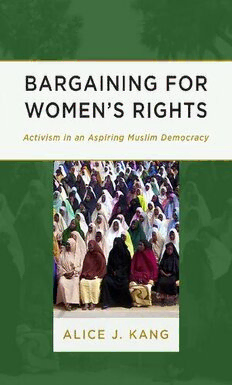
Bargaining for Women's Rights: Activism in an Aspiring Muslim Democracy PDF
Preview Bargaining for Women's Rights: Activism in an Aspiring Muslim Democracy
bargaining for women’s rights This page intentionally left blank BARGAINING FOR WOMEN’S RIGHTS Activism in an Aspiring Muslim Democracy alice j. kang University of Minnesota Press Minneapolis London The University of Minnesota Press gratefully acknowledges financial assistance for the publication of this book from the College of Arts and Sciences at the University of Nebraska–Lincoln. Portions of chapter 3 appeared previously in “The Effect of Gender Quota Laws on the Election of Women: Lessons from Niger,” Women’s Studies International Forum 41, no. 2 (2013): 94–102; reprinted with permission from Elsevier. Copyright 2015 by the Regents of the University of Minnesota All rights reserved. No part of this publication may be reproduced, stored in a retrie- val system, or transmitted, in any form or by any means, electronic, mechanical, photocopying, recording, or otherwise, without the prior written permission of the publisher. Published by the University of Minnesota Press 111 Third Avenue South, Suite 290 Minneapolis, MN 55401-2520 http://www.upress.umn.edu Library of Congress Cataloging-in-Publication Data Kang, Alice J. Bargaining for women’s rights : activism in an aspiring Muslim democracy / Alice J. Kang. Includes bibliographical references and index. ISBN 978-0-8166-9217-0 (hc : alk. paper) ISBN 978-0-8166-9218-7 (pb : alk. paper) 1. Women’s rights—Islamic countries. 2. Women’s rights—Niger—Case studies. 3. Women—Political activity—Islamic countries. 4. Women in development—Islamic countries. 5. Nongovernmental organizations—Islamic countries. I. Title. HQ1236.5.I74K36 2015 305.4209767—dc23 2014032698 Printed in the United States of America on acid-free paper The University of Minnesota is an equal-opportunity educator and employer. 21 20 19 18 17 16 15 10 9 8 7 6 5 4 3 2 1 tosung sook shin This page intentionally left blank CONTENTS Acknowledgments(cid:2) ix Abbreviations(cid:2) xiii Introduction Women’s Rights in an African Muslim Democracy 1 1 A French Colonial Legacy The Making of Niger’s Legal System 28 2 The Puzzle of Non- Adoption Why Niger Has No Family Code 46 3 Bargaining for Women’s Representation The Adoption of a Gender Quota 81 4 Bringing Rights Home How Niger Ratified CEDAW and Rejected the Maputo Protocol 120 Conclusion Rethinking Women’s Activism 151 Appendix: Research Methods 167 Notes 173 Bibliography 203 Index 225 This page intentionally left blank ACKNOWLEDGMENTS In the course of writing this book, I have become indebted to numerous indi- viduals, associations, and institutions, though any errors in the pages that fol- low are mine alone. First and foremost, I am grateful to the women’s activists, conservative activists, and state officials in Niger who received me in their homes and workplaces and talked with me about their work. Whereas some interviewees gave me permission to publish their names, others wished to be identified by their associational affiliation, arguing that their advocacy was done in the name of a broader collective. As a result, I refrain from naming individuals whom I interviewed and refer to their position in their associa- tions or institutions instead. This book dates back to when I was a doctoral candidate in political sci- ence at the University of Wisconsin–Madison. I thank Aili Mari Tripp for her constant support, feedback on draft proposals and chapters, and phone calls while I was in the field. Michael Schatzberg challenged me to read broadly, think about politics differently, and see things “from the other end of the tele- scope.” Christina Ewig asked pertinent questions about this project from its inception to its defense and showed me where to look for answers. Scott Straus’s advice throughout the project also made for a much better product, and Crawford Young was a delight with whom to discuss Nigérien politics. Jon Pevehouse, Asifa Quraishi, Christa Tiernan, and participants at the Compara- tive Politics Colloquium and International Relations Colloquium gave helpful feedback on the project. The Gender and Women in Social Science Writing Group, which included Valerie Hennings, Elizabeth Holzer, Kristy Kelly, Lau- ren McCarthy, Kimiko Osawa, and Aili Tripp, provided constructive criticism on early drafts of the dissertation. Fellow students of Africa Melinda Adams, Ladan Affi, Kelly Duke Bryant, Libbie Freed, Sarah Hardin, Brandon Kend- hammer, Carmen McCain, and Naaborko Sackeyfio-Lenoch, along with the . ix
